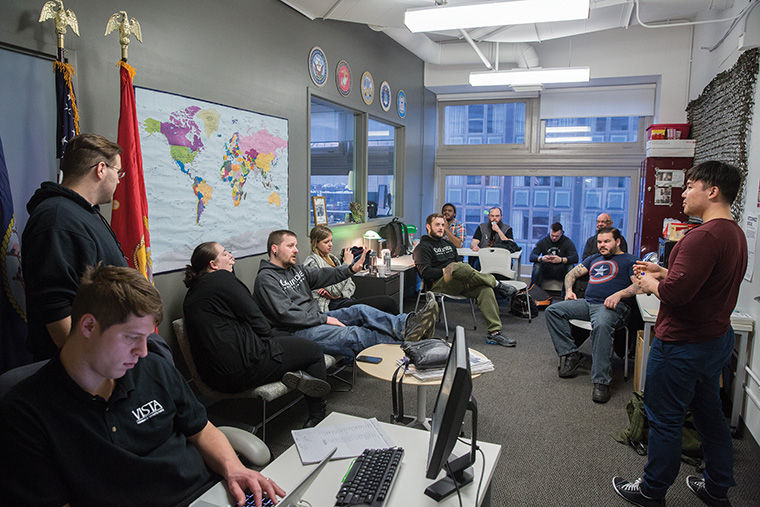Veteran society receives national recognition
Veteran society receives national recognition
March 16, 2015
The college’s Student Veterans Society has been named Chapter of the Month by the Student Veterans of America, a national organization that provides various resources for military veterans in higher education.
The group was not told beforehand they were going to be highlighted by the organization, said Tom Nawrocki, associate professor in the English Department and faculty advisor of the Student Veterans Society.
“To have [the group] gain national recognition is really exciting,” Nawrocki said.
The Chapter of the Month designation began as a way to celebrate the work of a specific chapter and typically decided by SVA’s outreach team, which votes at the end of each month on noteworthy groups, said Walter Tillman, director of programs at SVA.
More than 1,200 chapters are eligible for Chapter of the Month nationwide, Tillman said. He said the decision to recognize Columbia’s Student Veterans Society made sense because of the work it has done on campus and in the community.
“It was an easy call to make,” Tillman said. “Once we started looking at what some of our other chapters were doing over the past couple months, I would say that Columbia College was definitely deserving to be a chapter [of the month].”
Nawrocki said one of the ways he thinks the Student Veterans Society is different than other chapters is the number of student veterans involved in the group. This has enabled Columbia’s Student Veterans Society to hold a fundraiser in 2013 that raised more than $23,000 for homeless veterans, according to SVA’s website.
“Most chapters have only one or two veterans participating,” Nawrocki said. “Our group is one of the largest groups. That’s another reason I think they wanted to recognize us. I know we’re one of the largest groups in Illinois and we continue to expand and reach out.”
Tillman said SVA also thinks Columbia’s group has worked toward “breaking the stigma” of veterans in the arts community through different organized events.
“The value with veterans engaging with the arts is it provides another outlet to process the experiences and helps enable them to be more successful as they continue their academic pursuits,” he said.
Brian Ngo, president of the Student Veterans Society and a senior public relations major, said there are stereotypes about who student veterans are, and the Student Veterans Society works to disprove those misconceptions.
Because of unfortunate stereotypes, Ngo said it is important for Columbia’s student veterans to have a prominent presence on campus.
“The reason veterans need such a large voice is because [they are] misrepresented,” Ngo said. “We have so many voices speaking for us. We have the movies [and] we have mass media propagating what military life is truly like. Pretty much everybody has some outlook, some voice [or] some opinion on [being a veteran], and that’s what affects who we are. We need to have our own voice, from our own personal view.”
The college’s Student Veterans Society’s status as Chapter of the Month makes them eligible to become the Student Veterans of America’s 2015 Chapter of the Year, according to Tillman.
Ngo said being recognized as Chapter of the Year would bring even more positive attention to the group across the campus.
“It would enhance the administration’s view on veterans being a part of the college community and the ability for them to contribute to student life and the ideology that the school has,” Ngo said.
Kai Allen Blakley, a senior cinema art + science major and a member of SVS, said it was an honor to be nationally recognized. Blakley said the group is successful because of the strong bond the student veterans have developed with each other outside of the meetings.
“We have a very close relationship,” Blakley said. “It carries outside of [the group], too, and I think that’s what keeps people coming to the center and keeps the whole organization really active—we’re all very tight.”
As for the future of the group, Ngo said he wants to continue creating educational opportunities for the student community to be a place for student veterans to find friendship and support.
“Our ultimate goal, besides [to] provide a base of understanding with the regular student population, is to be the first place for veterans who enter their academic career—the place that they come to,” he said.








